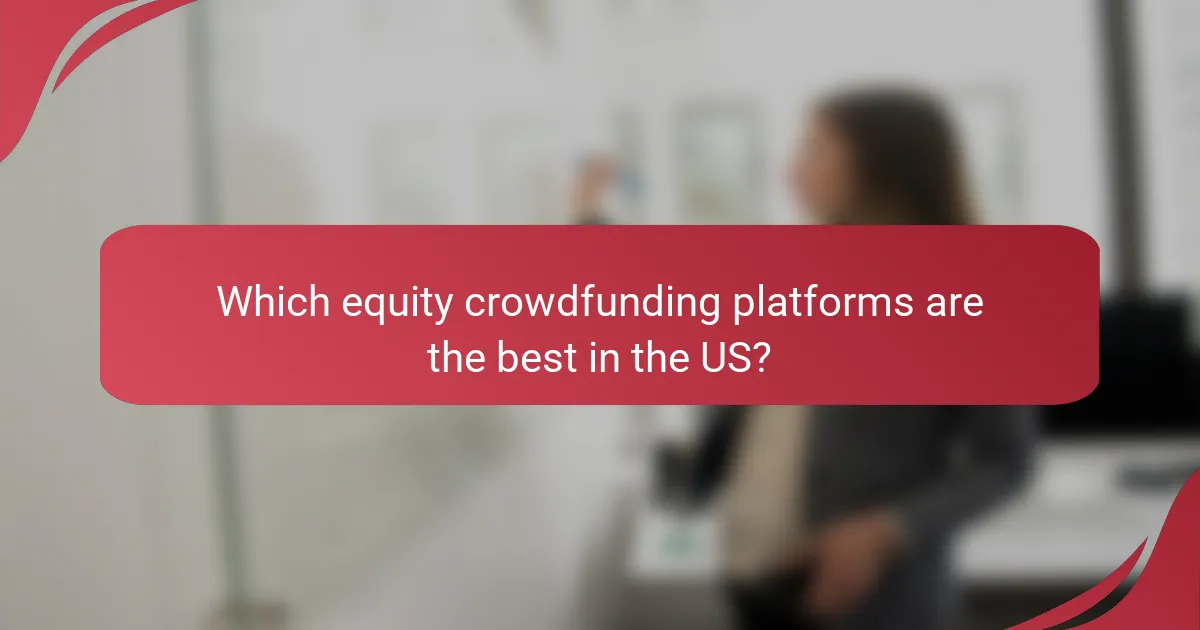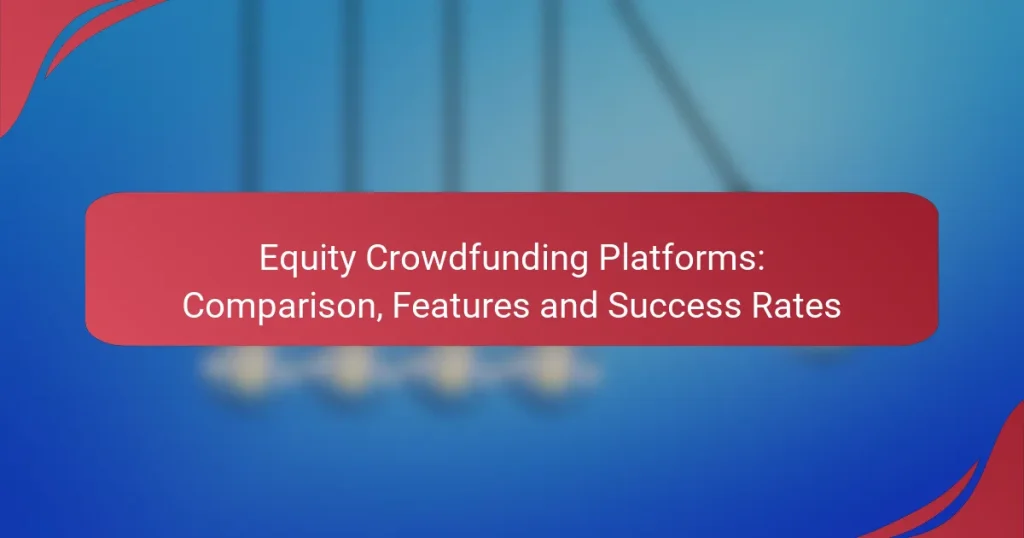Equity crowdfunding platforms offer a unique opportunity for entrepreneurs to raise capital while enabling investors to support innovative ventures. With key players like Kickstarter, Indiegogo, SeedInvest, StartEngine, and WeFunder, each platform presents distinct features and varying success rates that can influence fundraising outcomes. When choosing a platform, it’s essential to consider factors such as fee structures, investor reach, and campaign support to maximize your chances of success.

Which equity crowdfunding platforms are the best in the US?
The best equity crowdfunding platforms in the US provide entrepreneurs with access to capital while allowing investors to support innovative startups. Key platforms include Kickstarter, Indiegogo, SeedInvest, StartEngine, and WeFunder, each offering unique features and varying success rates.
Kickstarter
Kickstarter is primarily known for rewards-based crowdfunding, but it has expanded to include equity crowdfunding options for certain projects. It allows creators to offer backers rewards in exchange for their support, which can include equity stakes in some cases.
When using Kickstarter, it’s essential to have a compelling project and a strong marketing strategy. Successful campaigns often feature engaging videos and clear funding goals. However, keep in mind that Kickstarter has an all-or-nothing funding model, meaning you only receive funds if you meet your goal.
Indiegogo
Indiegogo offers both rewards-based and equity crowdfunding options, making it versatile for different types of projects. It allows entrepreneurs to raise funds without the strict all-or-nothing requirement, providing more flexibility in funding goals.
On Indiegogo, campaigns can be launched with a variety of funding models, including fixed and flexible funding. This platform is suitable for startups looking to test market interest before fully committing to a product launch. However, it’s crucial to maintain communication with backers to build trust and encourage future investments.
SeedInvest
SeedInvest specializes in equity crowdfunding, connecting startups with accredited investors. This platform allows businesses to raise capital by offering equity shares, making it a good option for companies looking for serious investment rather than just donations.
To succeed on SeedInvest, startups must undergo a rigorous vetting process, ensuring that only high-quality projects are presented to investors. This can enhance credibility but may limit access for some entrepreneurs. It’s advisable to prepare a solid business plan and financial projections to attract potential investors.
StartEngine
StartEngine is a leading equity crowdfunding platform that enables companies to raise funds from both accredited and non-accredited investors. This democratization of investment allows a broader audience to participate in funding startups.
StartEngine offers various investment options, including equity and revenue-sharing agreements. Entrepreneurs should focus on creating a compelling pitch and providing clear information about their business model. Engaging with potential investors through updates and communication can significantly improve success rates.
WeFunder
WeFunder is another popular equity crowdfunding platform that allows startups to raise capital from everyday investors. It supports both equity and revenue-sharing models, making it accessible for a wide range of businesses.
To maximize success on WeFunder, startups should leverage the platform’s community features, such as sharing updates and engaging with backers. A well-crafted pitch and a clear understanding of the funding process are essential. Additionally, offering attractive investment terms can help draw in more investors.

What features should I consider when choosing a platform?
When selecting an equity crowdfunding platform, consider factors like fee structures, investor reach, campaign support, and regulatory compliance. These features significantly impact your fundraising success and overall experience.
Fee structures
Fee structures vary widely among equity crowdfunding platforms, typically including upfront fees, success fees, and ongoing charges. Most platforms charge a percentage of the funds raised, often ranging from 5% to 10%, in addition to payment processing fees.
Some platforms may also have tiered pricing based on the amount you raise, so it’s crucial to understand how these fees will affect your net proceeds. Always read the fine print to avoid unexpected costs.
Investor reach
Investor reach refers to the platform’s ability to connect you with potential backers. Platforms with a larger user base can provide access to more investors, increasing your chances of meeting your fundraising goals.
Consider platforms that have a strong marketing presence and actively promote campaigns. Some may also offer features like social sharing tools to help amplify your reach.
Campaign support
Campaign support includes the resources and assistance provided by the platform to help you create and manage your fundraising campaign. Look for platforms that offer guidance on crafting your pitch, marketing strategies, and ongoing communication with investors.
Some platforms provide dedicated account managers or access to educational resources, which can be invaluable in navigating the crowdfunding process successfully.
Regulatory compliance
Regulatory compliance is essential for ensuring your campaign adheres to local laws governing equity crowdfunding. Different countries have varying regulations, so it’s vital to choose a platform that understands and complies with these rules.
In the U.S., for example, platforms must adhere to SEC regulations, while European platforms may follow different guidelines. Ensure the platform you select has a solid track record of compliance to avoid legal issues down the line.

How do success rates compare among platforms?
Success rates among equity crowdfunding platforms vary significantly, influenced by factors such as project type, funding goals, and marketing strategies. Generally, platforms like Kickstarter and Indiegogo have higher success rates for creative projects, while SeedInvest and StartEngine cater more to startups and businesses, often showing different metrics of success.
Kickstarter success rate
Kickstarter boasts a success rate of approximately 30-40% for projects that meet their funding goals. This platform is particularly effective for creative endeavors such as art, music, and technology. Projects that engage their audience early and maintain strong communication tend to perform better.
To improve your chances on Kickstarter, focus on creating a compelling project page, offering attractive rewards, and leveraging social media for promotion. Avoid launching without a solid marketing plan, as visibility is crucial for success.
Indiegogo success rate
Indiegogo’s success rate is somewhat similar to Kickstarter, ranging from 30-40%, but it offers more flexible funding options. This means creators can keep funds even if they do not meet their goal, which can be beneficial for certain projects. Indiegogo is popular for tech innovations and personal projects.
When using Indiegogo, consider using the InDemand feature to continue raising funds after your campaign ends. Ensure your project has a clear narrative and strong visuals to attract backers. Avoid neglecting updates, as keeping your backers informed can enhance trust and engagement.
SeedInvest success rate
SeedInvest has a lower success rate, typically around 20%, as it focuses on equity investments in startups. This platform requires companies to meet strict criteria, which can lead to a more selective process. Investors on SeedInvest are often looking for innovative business models and strong management teams.
To succeed on SeedInvest, ensure your business plan is robust and clearly outlines your market potential. Engaging with potential investors through detailed presentations and Q&A sessions can significantly enhance your chances. Do not overlook the importance of compliance with regulations, as this is critical in the equity crowdfunding space.
StartEngine success rate
StartEngine’s success rate is comparable to SeedInvest, generally around 20-30%. It allows a wide range of businesses to raise funds, including those in the consumer goods and technology sectors. StartEngine also offers a secondary market for investors, which can attract more backers.
To maximize your chances on StartEngine, focus on building a strong community around your brand and maintaining transparency with your investors. Regular updates and clear communication can foster trust. Avoid underestimating the importance of a well-prepared pitch video, as it can significantly impact investor interest.

What are the prerequisites for launching a campaign?
To successfully launch an equity crowdfunding campaign, you need a solid business plan, clear funding goals, and compliance with relevant regulations. These prerequisites ensure that your campaign is appealing to potential investors and meets legal standards.
Business plan requirements
A comprehensive business plan is essential for any crowdfunding campaign. It should outline your business model, market analysis, competitive landscape, and financial projections. Investors will look for clarity on how their funds will be used and the expected return on investment.
Include details such as your value proposition, target audience, and marketing strategy. A well-structured plan not only attracts investors but also serves as a roadmap for your business’s growth and development.
Funding goals
Setting realistic funding goals is crucial for a successful crowdfunding campaign. Determine how much capital you need to achieve specific milestones and ensure that your goals are aligned with your business plan. Common funding ranges can vary widely, often from a few thousand to several million dollars, depending on the business stage and industry.
Consider breaking down your funding goals into tiers, where each level unlocks additional benefits or milestones for investors. This approach can incentivize more contributions and create a sense of urgency among potential backers.


